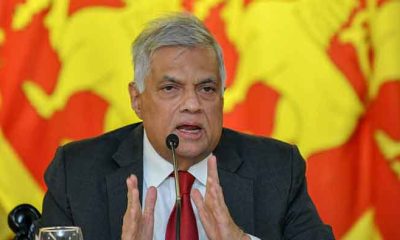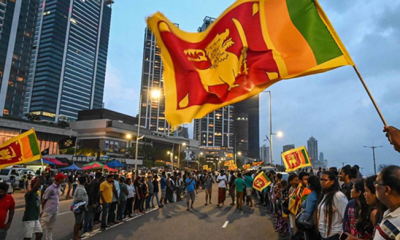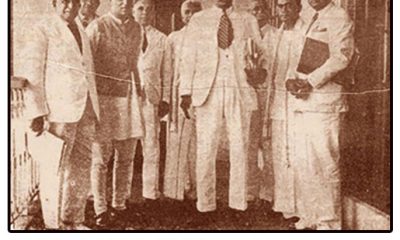News
Parliament rejected two anti-corruption proposals

Ex-COPE Chairman makes another revelation:
By Shamindra Ferdinando
Parliament has blocked two specific proposals made by MP Prof. Charitha Herath in his capacity as the Chairman of the Committee on Public Enterprises (COPE) to enable the Parliamentary Watchdog Committee to engage the Attorney General in high profile corruption cases, directly.
SLPP National List MP Herath lost the COPE Chairmanship with the prorogation of the Parliament on 28 July by President Ranil Wickremesinghe. The prorogation results in suspension of all business before the House and quashed all proceedings pending at the time, except impeachments.
Prof. Herath told The Island yesterday (25) that in consultation with Auditor General W. P. C. Wickremaratne, he had requested for the modification of Standing Orders 120, several months back, to permit the COPE to call for Attorney General’s interventions as and when necessary. If that was not acceptable, Parliament should approve specific requests made by him on behalf of the COPE, he suggested.
Prof. Herath said that the alternative, too, has been rejected. Responding to another query, he said that he had submitted the proposals to the Parliamentary Committee on Standing Orders. The Committee consists of nine members, including the Speaker, the Deputy Speaker and the Deputy Chairman of Committees.
Appearing before the Parliamentary Committee on Standing Orders, Prof. Herath also suggested that if proposals submitted in writing weren’t acceptable then at least a representative of the Attorney General should be allowed to participate in the COPE proceedings. That proposal too was turned down.
Prof. Herath said that the rejection of specific measures to address corruption accusations should be examined against the backdrop of the economic fallout of waste, corruption, irregularities and mismanagement of the national economy as well as the unprecedented recommendation by the United Nations Human Rights Council (UNHRC) to investigate economic crimes that impact on human rights and the tracing and recovery of stolen assets.
Prof. Herath alleged that the Parliament should be seriously concerned over the Geneva intervention especially because the country was seeking immediate assistance from the International Monetary Fund (IMF). Asserting that the situation was so grave that even USD 2.9 bn loan facility spread over a period of four years couldn’t revive the national economy, Prof. Herath emphasised that streamlining of public sector enterprises was a prerequisite for the economic recovery process. Therefore, corruption had to be curtailed by taking tangible measures, he said.
Prof. Herath said that though the particular Standing Order had been amended it didn’t meet their aspirations. What has been approved by the Parliament was inadequate to meet the growing threat posed by influential racketeers, the outspoken MP said. Prof. Herath has closed ranks with the dissident SLPP group, led by Party Chairman Prof. G.L. Peiris, and Dullas Alahapperuma. Other members of the group are Prof. Channa Jayasumana, Dr. Nalaka Godahewa, Dilan Perera, Dr. Upali Galappatti, Dr. Thilak Rajapaksa, Lalith Ellawala, K.P. S. Kumarasiri, Wasantha Yapa Bandara, Gunapala Ratnasekera and Udayana Kiridigoda.
Prof. Herath said that as the SLPP declined to allocate time for members of the rebel group, he was compelled to obtain five minutes from the Opposition to take up the issue in Parliament.Appreciating Opposition Leader Sajith Premadasa and Chief Opposition Whip Lakshman Kiriella for giving him the opportunity, Prof. Herath pointed out how a carefully prepared set of proposals to strengthen the COPE had been rejected.
Prof. Herath stressed that the intervention of the COPE was required as the Secretaries to the Ministries often failed to proceed with the instructions issued to them. The MP found fault with section 3 and 4 of Standing Orders 120. Declaring that though the Parliament was routinely blamed for its failure to arrest corruption, MP Herath said that Members of Parliament weren’t aware of what was going on. He also called for the strengthening of Standing Orders 119, 120 and 121 that dealt with the Committee on Public Accounts (COPA), COPE and the Committee on Public Finance (COPF), respectively.
MP Herath declared in Parliament that the crux of the matter was that those appointed members of the Cabinet represented the interests of the Executive and thereby undermined the very basis of the responsibilities of the House. The undeniable truth was that the Cabinet ministers didn’t represent the interests of the Parliament. “In other words, they worked against the collective responsibility as members of Parliament to ensure financial discipline,” MP Herath said, pointing out that in some countries the lawmakers were not entrusted with the task of decision-making.
Referring to Executive Sub-Committees to be established, Prof. Herath emphasized the pivotal importance of recognizing their responsibilities. If they were answerable to the Executive there would be serious consequences pertaining to the parliamentary system. Executive Sub-Committees shouldn’t be at the expense of the Parliament, the MP said, underscoring the responsibility of the part of all political parties represented in Parliament to take immediate remedial measures.
The rejection of the COPE proposals meant that the Parliament,as an institution hadn’t been sensitive to the recent public upheaval that forced Gotabaya Rajapaksa, elected with a staggering 6.9 mn votes to give up the presidency and literally flee for his life.
Ranil Wickremesinghe, who had been elected by Parliament to complete the remainder of the five-year term secured by Gotabaya Rajapaksa, and the SLPP, hadn’t realised the need to introduce urgent reforms, the MP alleged.Prof. Herath also questioned the rationale behind setting up of the National Council when the powers that be deprived the existing mechanisms required power to achieve their objectives.
News
Japan-funded anti-corruption project launched again

‘NPP taking credit for what was started during previous govt.’
The National Anti-Corruption Action Plan (NACAP) 2025-2029, ceremonially launched by President Anura Kumara Dissanayake on 09 April, 2025, had actually got underway during former President Ranil Wickremesinghe’s tenure, sources said.
According to a joint media release issued by the interested parties, following the launch, also attended by Chief Justice Murdu Fernando, PC, the Commission to Investigate Allegations of Bribery and Corruption (CIABOC)-led project received the financial backing of Japan and the technical expertise of the UNDP.
In response to The Island query regarding the recipients of the funding, exact amounts provided to them and the duration of the project, sources said that the 18-month-long project, implemented by the UNDP, had been launched in March 2024. According to sources, the project was launched with Yen 137 mn made available through the Japanese Supplementary Budget (approximately 931,000 USD) six months before the last presidential election.
New Japanese Ambassador in Colombo Akio Isomata, and UNDP Resident Representative Ms. Azusa Kubota, were among those present at the 09 April launch.
Isomata’s predecessor Mizukoshi Hideaki finalised the agreement with Ms Kubota on 12 February, 2024, to pave the way for the new project, titled ‘The Project for Promoting Economic Governance through Anti-corruption Policy Support.’
Assistance from Japan and UNDP was in line with their efforts to enable Sri Lanka struggling to resolve the economic crisis.
The Japanese Embassy said on 12 February, 2024, that the project sought to (1) strengthen legal and policy frameworks; (2) improve coordination among key institutions combating financial and tax crimes; and (3) enhance strategic institutional and individual skills and capacities around combating anti-corruption through strategic action.
By Shamindra Ferdinando
News
Ranil makes statement to CIABOC

Former President Ranil Wickremesinghe leaving the Commission to Investigate Allegations of Bribery or Corruption (CIABOC) yesterday after making a statement related to ongoing investigation into former State Minister Chamara Sampath Dassanayake. Dassanayake is in remand custody pending investigations into an alleged misappropriation of funds during his tenure as the Uva Province Chief Minister.
(Pic by Nishan S. Priyantha)
News
Nearly 500 kilos of heroin destroyed under court supervision

The police and court officials yesterday (28) supervised the destruction of nearly 500 kilos of heroin at the INSEE Cement Plant located in Puttalam.
The following is the text of statement issued by the INSEE Ecocycle Lanka (Private) Limited in this regard: ” Building on a consistent track record of supporting national anti-narcotics initiatives and eradicating a national menace, INSEE Ecocycle Lanka (Private) Limited, the leading professional waste management solutions provider, collaborated once more with the Sri Lanka Police Narcotics Bureau (PNB) and the National Dangerous Drugs Control Board (NDDCB) to responsibly dispose of 494.048 kgs of confiscated heroin via co-processing technology.
This marks the fourth collaboration between INSEE Ecocycle and law enforcement authorities for the destruction of such substances, following successful disposals carried out in 2018, 2019, and 2023 totalling approximately 1804 kgs of dangerous drugs.
The disposal, which ensured environmentally safe and secure destruction of the narcotics, was conducted on 28 April at the INSEE Cement Plant located in Puttalam, under the strict supervision of PNB officials and court-appointed representatives.
Prior to disposal, the confiscated heroin, seized during national anti-narcotics operations, was rigorously verified by the Government Analyst Department (GAD), NDDCB, and judicial authorities to ensure compliance with legal and safety protocols.
INSEE Cement Sri Lanka Chairman/CEO Nandana Ekanayake explained: “INSEE Cement is the only fully integrated cement manufacturing facility in the country with the required capability to provide this solution. We proudly support the national cause and contribute to building a drug-free nation. Sri Lanka’s only operational Cement Kiln Co-processing facility is in our Puttalam Cement Plant. INSEE Cement has always focused on the Health and Safety of all our stakeholders. As a responsible corporate citizen, we are proud and honoured to extend our support and ensure the safe disposal of harmful substances with utmost care and professionalism.”
Emphasizing the significance of the initiative, Sujith Gunawardena, Director, INSEE Ecocycle, said, “As Sri Lanka’s sole provider of co-processing technology, we are proud to collaborate with the authorities and support this critical effort. We successfully disposed of the confiscated narcotics in an environmentally friendly and sustainable manner, complying with all the regulations. Co-processing offers a complete destruction solution for hazardous waste at extremely high temperatures, eliminating it without harmful emissions or residual byproducts. It is a cleaner and more sustainable solution than traditional incineration. It is globally accepted as the superior waste management method, significantly reducing greenhouse gas emissions and aligning with global best practices for sustainable waste management.”
INSEE Ecocycle played a critical role in the technical evaluation of the feeding mechanism and pre-processing activities, collaborating closely with PNB and NDDCB to guarantee the safe disposal of the hazardous substance. The comprehensive technical evaluation comprised thorough risk assessments and mitigation action plans, addressing environmental, social, health, and safety concerns for the entire pre-processing and co-processing value chain.
Throughout the confiscated heroin disposal process, experts from PNB and NDDCB provided guidance on critical components, including laboratory analyses and procedural adherence, culminating in the secure and transparent destruction of the narcotic substance. The disposal took place using cement kiln co-processing technology, also known as thermal destruction, at temperatures of 1800- 2000 °C with a 4-6 sec residence time and under fully controlled process parameters.
INSEE’s co-processing facility satisfies all regulatory requirements and technical standards and is globally adopted for waste management. The facility offers a complete solution with zero harmful emissions to the environment. It has also obtained all required licenses, such as the Environmental Protection License and Scheduled Waste Management License from the Central Environmental Authority and the Provincial Environmental Authority, and certifications including ISO 9001, ISO 14001, ISO 17025, ISO 39001, and ISO 45001.
With a proud legacy of over two decades, INSEE Ecocycle has managed more than 1.3 million metric tons of industrial waste in collaboration with over 1,000 customers, including multinationals, local conglomerates, corporations, government authorities at central and regional levels, and recycling partners. The partnership demonstrates the company’s commitment to advancing Sri Lanka’s circular economy and environmental stewardship.”
-

 News7 days ago
News7 days agoOrders under the provisions of the Prevention of Corruptions Act No. 9 of 2023 for concurrence of parliament
-

 Business2 days ago
Business2 days agoPick My Pet wins Best Pet Boarding and Grooming Facilitator award
-

 News6 days ago
News6 days agoProf. Rambukwella passes away
-

 News2 days ago
News2 days agoNew Lankan HC to Australia assumes duties
-

 Features2 days ago
Features2 days agoKing Donald and the executive presidency
-

 Business2 days ago
Business2 days agoACHE Honoured as best institute for American-standard education
-

 Features4 days ago
Features4 days agoThe Truth will set us free – I
-

 Features6 days ago
Features6 days agoThe sea-change after Modi’s visit
























